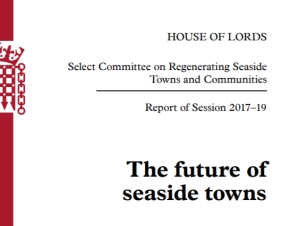Future of seaside towns
In April 2019, the Regenerating Seaside Towns Committee of the House of Lords published a report on the future of seaside towns, and noted that many coastal communities are in need of investment, particularly in housing, transport, education and infrastructure.
The Committee wrote:
Many seaside towns and coastal communities are in desperate need of improvements to transport, housing and broadband. Better access to further and higher education for young people in seaside towns is needed too.
The Chairman of the Committee, Lord Bassam of Brighton, said:
"For too long, seaside towns have been neglected. They suffer from issues rooted in the decline of their core industries, most notably domestic tourism, but also in fishing, shipbuilding and port activity, and from their location at the ‘end of the line’. The potential impact of Brexit on these towns, particularly the hospitality sector, also remains an open question.
"A single solution to their economic and social challenges doesn’t exist. What is needed is a package of strategic initiatives and interventions where national and local government work together to address issues such as transport, housing, post-school education and high-speed broadband.
"Places like Brighton and Bournemouth have shown that ‘the seaside’ can successfully reinvent itself. The Committee is confident that if our recommendations are pursued seaside towns can once again become prosperous and desirable places to live in and visit."
The main findings and conclusions from the report include:
- The challenges of peripherality in coastal areas can be overcome by improving digital connectivity. The Government should promote initiatives to support digital connectivity in coastal communities specifically. It should engage with local authorities, Local Enterprise Partnerships (LEPs) and businesses in remote coastal communities to understand how better digital connectivity, such as high-speed broadband, can be delivered.
- Limited access to education, particularly to FE and HE institutions, is severely curtailing opportunities and denting aspirations for young people in some coastal areas. The Government needs to facilitate partnership working between the FE and HE sectors, and local business and industry, in coastal and other isolated areas.
- Poor-quality housing is a significant problem for many seaside towns. The Committee recommends a package of measures for housing to help tackle perverse financial incentives to offer poor accommodation, ease the pressures on inspection and enforcement regimes, and to support more regeneration of existing housing.
- Inadequate transport connectivity is holding back many coastal communities. The Government should prioritise improvements to the coastal transport network when it takes decisions on planning and investment. This should be informed by a detailed review of the coastal transport network.
- Many seaside towns feel left behind by national strategies aimed at increasing economic growth and productivity. Local Industrial Strategies present a key opportunity for renewed focus on addressing the skills gaps, low-wage economies and aspiration challenges faced by many coastal communities. As LEPs develop these strategies, the Committee recommends that they are given a specific requirement to consider the needs of deprived seaside towns and communities.
- The UK Shared Prosperity Fund, which is set to replace EU funding after Brexit, is an important opportunity to help support coastal business development, and to tackle deprivation in coastal communities. The Government must be clear about how coastal areas will benefit from the Fund. The Fund should prioritise solutions for areas where there has been persistent deprivation, including disadvantaged coastal communities.
- The Coastal Communities Fund is viewed as too small scale to support sustainable regeneration. The Government should review the Fund’s effectiveness. If it is making a positive impact, then it should continue with it and increase the Fund’s resources.
- The Committee strongly supports the Grimsby town deal, involving a strategic approach between national and local government, and LEPS. The Committee recommends that the Government should secure town deals with other coastal towns. Given that issues relating to housing and deprivation in Blackpool are well-recognised as being some of the most significant in the country, the Committee recommends a town deal is secured with Blackpool first.
- A variant of Enterprise Zones designated specifically for coastal areas could offer seaside towns a package of placed-based interventions. This could support long term, sustainable change. The Committee recommends that new Enterprise Zones be created in coastal locations, and that the support offered should be tailored to meet the specific needs of seaside towns.
- Some towns have boosted regeneration by cultivating their local creative industries. The Committee supports this arts-led regeneration and wishes to see other towns diversifying their economies and enhancing their local cultural assets in this way….
You can download the report on the parliament website
This article originally appeared on the IHBC Blog.
--Institute of Historic Building Conservation
Related articles on Designing Buildings
- A vision of the Future – A blueprint for the Industry from Canada’s West Coast.
- Coastal change management area.
- Coastal defences.
- Coastal Transition Zone.
- Conservation.
- Conserving Cornish harbours.
- England's seaside heritage from the air.
- Enterprise Zones.
- Heritage coast.
- IHBC articles on Designing Buildings Wiki.
- IHBC.
- Local Enterprise Partnerships.
IHBC NewsBlog
Purcell’s guidance on RAAC for Listed Buildings in England & Wales
The guidance specifically focuses on Reinforced Autoclaved Aerated Concrete (RAAC) in listed buildings.
IHBC Membership Journal Context - Latest Issue on 'Hadrian's Wall' Published
The issue includes takes on the wall 'end-to-end' including 'the man who saved it'.
Heritage Building Retrofit Toolkit developed by City of London and Purcell
The toolkit is designed to provide clear and actionable guidance for owners, occupiers and caretakers of historic and listed buildings.
70 countries sign Declaration de Chaillot at Buildings & Climate Global Forum
The declaration is a foundational document enabling progress towards a ‘rapid, fair, and effective transition of the buildings sector’
Bookings open for IHBC Annual School 12-15 June 2024
Theme: Place and Building Care - Finance, Policy and People in Conservation Practice
Rare Sliding Canal Bridge in the UK gets a Major Update
A moveable rail bridge over the Stainforth and Keadby Canal in the Midlands in England has been completely overhauled.
'Restoration and Renewal: Developing the strategic case' Published
The House of Commons Library has published the research briefing, outlining the different options for the Palace of Westminster.
Brum’s Broad Street skyscraper plans approved with unusual rule for residents
A report by a council officer says that the development would provide for a mix of accommodation in a ‘high quality, secure environment...
English Housing Survey 2022 to 2023
Initial findings from the English Housing Survey 2022 to 2023 have been published.
Audit Wales research report: Sustainable development?
A new report from Audit Wales examines how Welsh Councils are supporting repurposing and regeneration of vacant properties and brownfield sites.

















